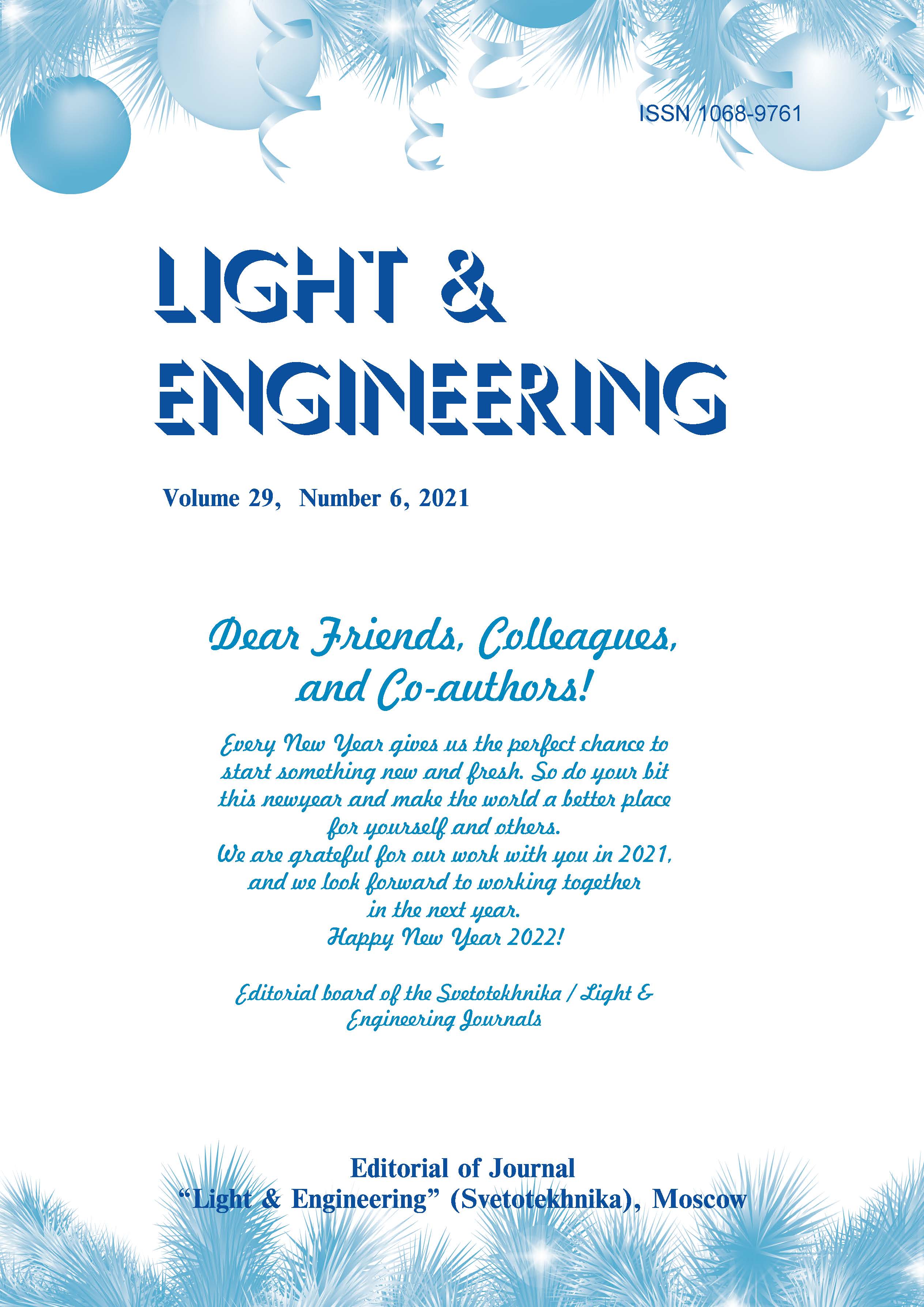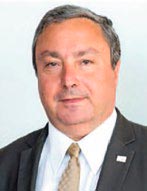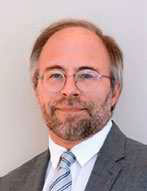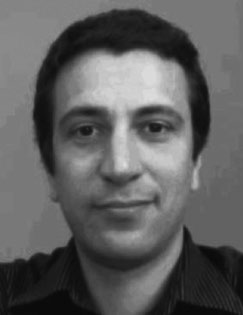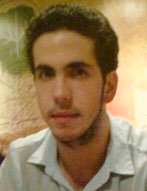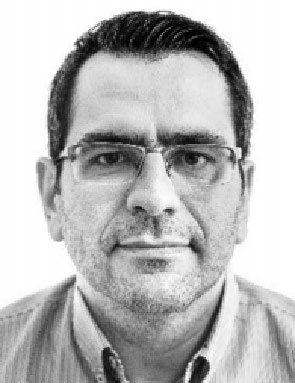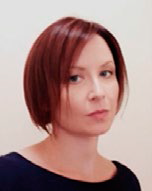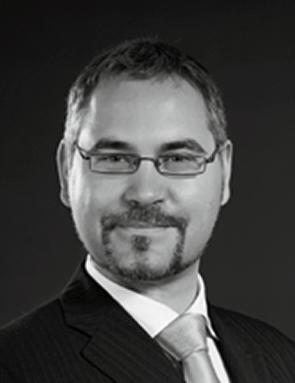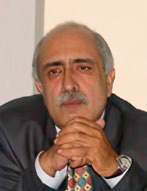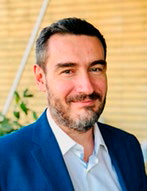Light & Engineering 29 (6)
Volume 29
Date of publication 12/28/2021
Pages 6–24
Purchase PDF - ₽450
Mapping the Needs for Trained Lighting Engineers in Construction Industry: The First Outcomes from ECOSLIGHT Skills Alliances European Project L&E, Vol. 29, No. 6, 2021
Articles authors:
Georges Zissis, Laurent Canale, David Buso, Evangelos-Nikolaos D. Madias, Constantinos Bouroussis, Marta Krakowiak, Alberto Sozza, Frangiskos V. Topalis, Stelios Zerefos
Georges Zissis, Prof., Vice-Rector Toulouse 3 University for International Projects & Cooperation, has been graduated in 1986 from Physics department of University of Crete in general physics. He got his M. Sc. and Ph.D. in Plasma Science in 1987 and 1990 from Toulouse 3 University (France). He is today Distinguish-class Professor in Toulouse 3 University. His primary area of work is in the field of Science and Technology Lighting Systems. He won in 2006 the 1st Award of the International Electrotechnics Committee Centenary Challenge for his work on standardisation for street lighting systems and in 2009 the Energy Globe Award for France. In 2011 he has been awarded the title of Doctor Honoris Causa of Saint Petersburg State University (Russian Federation). He was President of IEEE Industrial Applications Society. Today, he is Chairman of IEEE Smart Cities Program and he is chairing the 4E-Solid State Lighting Annex of International Energy Agency
Laurent Canale, Dr., CNRS Research Engineer. He holds a Master and Ph.D. focusing on High Frequencies Electronics and Optoelectronics from Sciences Department of Limoges University, obtained in 1998 and 2002. In 2010, he joined the National Center for Scientific Research (CNRS) and he works in LAPLACE Lab., “Light & Matter” research group, focused on efficient light sources as LED and OLED (SSL) with special interest in aging degradation mechanisms with photometrical, electrical and structural characterizations. He published over 120 articles dealing with artificial light sources, from the harmonic impact on the electrical grid to the human eye perception, the photosynthesis, the light pollution and artificial light applications including 5G or WiMax antennas embedded in OLED. He leads the French Illuminating Engineering Association as Midi-Pyrenees region Chairman since 2014 and the “Industry Lighting and Display Committee” from IEEE (IEEE IAS ILDC) as Vice-Chair since 2020
David Buso, Dr. He received the M. Sc. degree in electrical engineering and the Ph.D. degree from Université Toulouse 3–Paul Sabatier, Toulouse, France, in 2001 and 2004, respectively. From 2004 to 2006, he was involved in the design of dimming electronic ballasts with TridonicAtco GmbH, Dornbirn, Austria. Since 2006, he is Associate Professor with the Laboratoire Plasma et Conversion d’Energie (LAPLACE), Université Toulouse 3–Paul Sabatier, where he is also with the Light and Matter Group. His topics of interest include solid-state devices for light production, including LEDs, organic LEDs, and organic light-emitting transistors. His current research work includes the interaction between solid-state organic devices and their drivers, and the design and characterization of organic light-emitting devices
Evangelos-Nikolaos D. Madias has received a Diploma in Electrical & Computer Engineering from the National Technical University of Athens in 2010. He holds a M. Sc. Diploma in Mathematical Modelling in Modern Technologies & the Economy from the School of Applied Mathematical & Physical Sciences of the National Technical University of Athens (2012). Currently, he is a Ph.D. candidate at School of Electrical & Computer Engineering, National Technical University of Athens. The field of his Ph.D. research regards the development of a light sensor network for artificial lighting control. He is fluent in English, German and Russian. Since 2013 he is a Test Engineer and Researcher at Lighting Laboratory (NTUA). He has extensive experience in photometric, electric, spectral measurements of luminaires and lamps as well as quality assurance testing of interior and exterior lighting installations. He is the author of 21 publications. During his compulsory military service, he has served as an Analyst-Developer for the Information Technology Support Center of the Hellenic Army.
Constantinos Bouroussis, Dr. He is an Electrical and Computer Engineer. He received his Ph.D. in Engineering in the field of road and tunnel lighting measurements from the National Technical University of Athens (NTUA). He is currently a research associate at the Lighting Laboratory of NTUA, with participation in more than thirty internationally and nationally funded projects. He also works as an independent technical consultant and previously he was a member of the committees and lead author for the preparation of a Greek Technical Guide on Road Lighting and the Greek National Regulation for Road and Tunnel Lighting. His main areas of interest include lighting technology, photometry, imaging sensors, machine vision, and unmanned aerial systems. He has extensive experience in lighting measurements and evaluation of lighting infrastructures, lighting master planning, lighting education, instrument prototyping and other. He has given numerous lectures in lighting related aspects at universities and training institutes. Cost is participates in the CIE as the country member for Greece in Division 2. He is the Chair of TC2–95 “Measurement of obtrusive light and sky glow”, is a reporter in Division 4 (DR4–53 “Environmental Aspects of Obtrusive Light from Outdoor Lighting Installations”) and is a member of several other CIE TCs
Marta Krakowiak, Project manager at the ELCA European Lighting Cluster Alliance, aimed at strengthening the competitiveness of the European lighting sector (in particular SMEs) in the smart, energy-efficient and human-centric lighting in smart home, smart building and smart cities framework. She is Experienced Grant Project Manager and Project Developer with a demonstrated history of working in the EU-funded projects management and consulting for public and private entities. Skilled in international multi-stakeholder and complex project and program management, EU grants planning, negotiation, innovation management and project ideas development; responsible for the ELCA advisory service on strategic financing for research and innovation to SMEs and industries, and funding opportunities to ELCA cluster members, and developer and manager of the European projects, supporting its members in the international cooperation concerning innovation, clustering, training and mobility, coordinating relationships at all levels across target organizations and with stakeholders
Alberto Sozza, Dr. He has got M. Sc. and Ph.D. in Electronics (Microelectronics Reliability), 10 years of experience in LED lighting and innovative lighting technologies with more than 10 publications and patents. At present, he is President of “Luce In Veneto” consortium and ELCA (European Lighting Cluster Alliance), which promote the activity of the European SMEs lighting industry
Frangiskos V. Topalis, Prof., Ph.D., Mechanical and Electrical Engineer, is Professor at the School of Electrical and Computer Engineering of National Technical University of Athens, Laboratory of Lighting. He teaches the courses of lighting & photometry, lighting in electrical installations and quality assurance systems. He is author or co-author of 10 text books on lighting, 2 chapters in handbooks and more than 200 publications on lighting in international journals, technical brochures, and international conference proceedings. He has coordinated more than 50 projects in the field of photometry and lighting
Stelios Zerefos, Prof., School of Applied Arts, Hellenic Open University, is an architect (B.A.(hons), M. Arch.II, Ph.D.) and Professor of the School of Applied Arts and Sustainable Design of the Hellenic Open University since 2009. He is the Director of the Master’s Programme “Lighting Design”, Director of the M. Sc. “Protection of cultural heritage and monuments of nature from the effects of climate change” and Director of the Lighting Design Laboratory. Apart from the Hellenic Open University he has taught in graduate and post-graduate courses at the National Technical University of Athens, the University of West Attica, the University of Athens, the ESAD Matosinhos, the Technical University of Wismar and the Technical University of Berlin. He is a member of national and international scientific organizations, as well as editor and reviewer in international scientific journals such as MDPI Sustainability, Energies, Energy and Buildings and Solar Energy. He has scientific papers in peer-reviewed journals and conference proceedings and is also the author of four books. He was a member of the Greek Committee in two EU COST actions (ES1204 and C13) themed after light pollution and interactive building envelopes respectively. He is currently the scientific coordinator of an Erasmus+ SSA project and has also coordinated two finished research projects and participated in another 9 as a research member. His architectural work numbers more than 60 projects, 7 of which have achieved awards in Greek and international architectural competitions
Abstract:
The construction sector faces new challenges in order to provide smart, energy efficient and sustainable lighting environments for infrastructure, cities, buildings and the industry, in order to follow the 2050 low-carbon economy roadmap of the European Commission. In parallel, the Environmentally Conscious Smart Lighting (ECOSLIGHT) project aims to design training programs in lighting that will actively enhance employability and improve career prospects of lighting-related professionals, while also help businesses to find the right competences they need to increase their competitiveness. In this paper, by analysing critically the 438 collected answers though on-line ECOSLIGHT original developed questionnaire, we were able to understand clearly what are the needs of the sector for well-trained lighting professionals and indent the training needs for future lighting professionals who want find jobs in the sector. Further, we could establish standard “job-profiles” for two of the most popular need lighting professionals: lighting designers and lighting system engineers.
References:
1. Mischke, Jan. 2020. The next normal in construction How disruption is reshaping the world’s largest ecosystem. Zurich: McKinsey Global Institute (MGI). 2. National Surety Services Inc. 2020. Predicting the Future: Construction Industry Job Skills to Recruit for Now. http://nationalsurety.com/predicting-the-future-construction-industry-job-skills-to-recruit-for/. 3. Holoubek, Elisabeth. 2011. Lighting Solutions for Austrian Building Construction Projects – A Customer Analysis. Master’s Thesis, Wien: WU Executive Academy. 4. Amerlux Innovation Center. 2018. LED Energy Market Observer. Energy Observer: Energy Observer, August. 5. Global Markets Insights. 2019. “Smart Lighting Market Analysis – Global Industry Share Forecast 2025.” online teaser, Report ID: GMI413. 6. Frost & Sullivan. 2017. “Analysis of the LED Lighting Market in the GCC, forecast to 2020, F&S Energy & Environment Growth Partnership Service program.” 7. Statista. 2019. Digital Market outlook: Comfort and Lighting, online database. www.statista.com/outlook/392/125/comfort-and-lighting 8. IALD. n.d. International Lighting Association. Accessed May 2021, 2021. https://www.iald.org
Keywords
